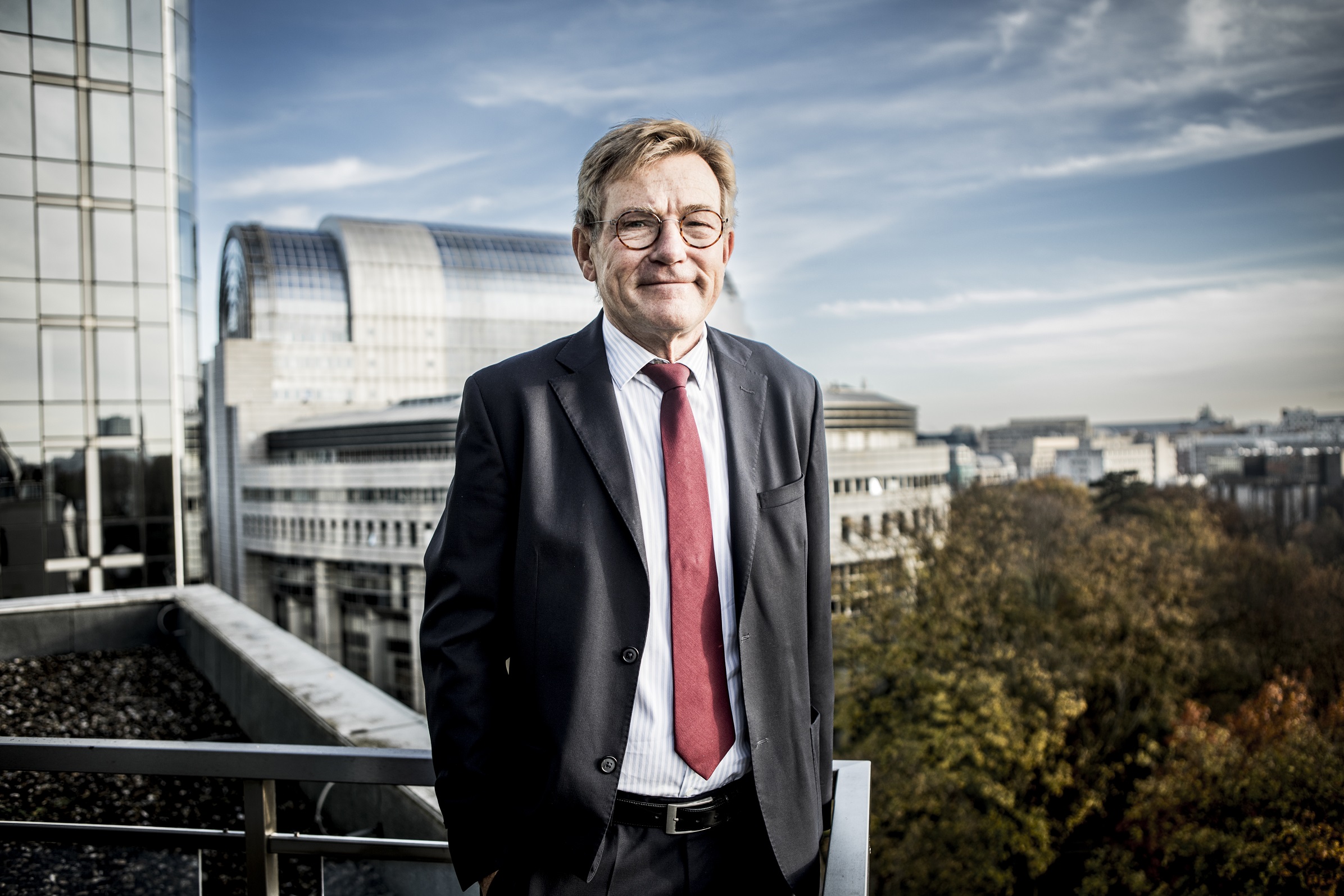A recent survey named Johan Van Overtveldt as the most influential member of the European Parliament. Not bad, considering the 68-year-old Belgian only entered politics a decade ago.
It’s an accolade Van Overtveldt’s proud of. But the powerful chair of the assembly’s Committee on Budgets and former Belgian Finance Minister is quick to give credit to the cool-headed, canny women at his side during a career that has straddled journalism, finance and government.
His admission doesn’t come as a total surprise.
Speaking in his office in a corner of the Parliament’s, labyrinthine Altiero Spinelli building in Brussels, I mention a photo on his Facebook page. It shows a beaming Van Overtveldt celebrating International Women’s Day with the females in his cabinet back at the ministry.
I ask him if women in his field are smarter the men. “That’s my experience,” he smiles. “When I was in banking and business, they were consistently more risk-aware than men. They’d say, ‘Don't do that now. Think about it three times first.’”
Female wisdom – their intuition perhaps – meant he avoided certain mistakes or would reassess initiatives that failed the ladies’ test. It was a similar story in journalism when he edited finance weekly Trends and news magazine Knack.
“Although I worked with and still work with very able men, women understand the risk element better. For instance, research has shown a clear link between the banks that escaped the financial crisis and the presence of women in senior jobs.”
His wife Daniëlle, a former banking executive who runs a business club in Antwerp province, is no exception. “She's certainly a risk-aware woman, with a knack for asking the right questions,” he laughs.
Given that the avoidance of risk seems so important to Van Overtveldt, his decision to give up his comfortable berth in journalism to go into the political jungle must have surprised some people, I venture.
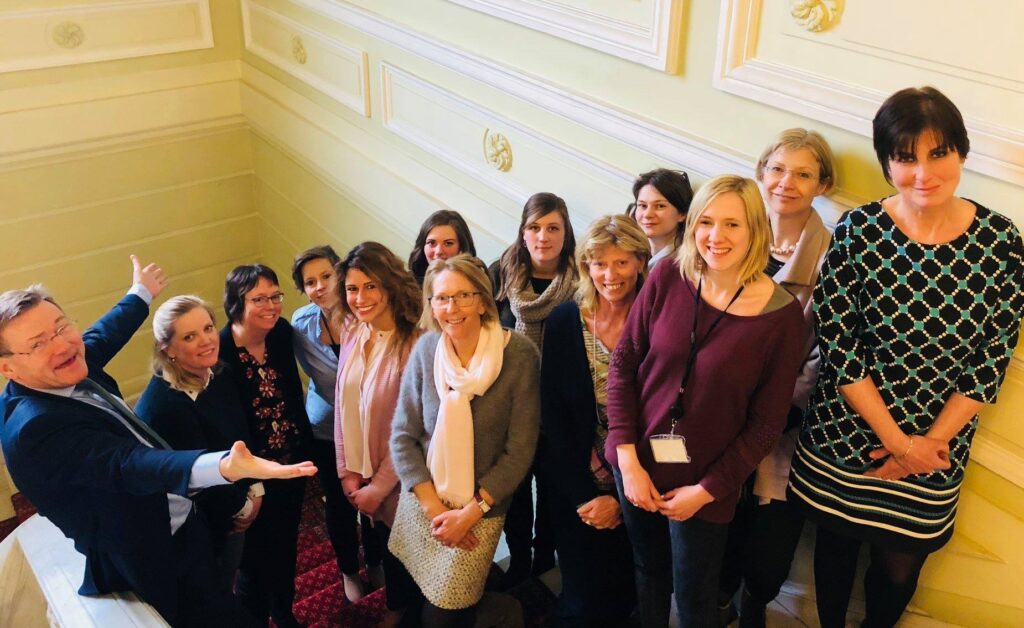
Van Overtveldt with the women in his staff
His late career switch was down to some gentle persuasion from Bart De Wever, Antwerp’s charismatic mayor and leader of the Flemish nationalist and conservative New Flemish Alliance (Nieuw-Vlaamse Alliantie, N-VA) party. “I was quite hesitant at first but I found what he was saying was very attractive intellectually,” Van Overtveldt says.
Unfortunate timing
Van Overtveldt was elected as an MEP in May 2014, but within eight months found himself appointed as finance minister by then Prime Minister Charles Michel. Van Overtveldt left the job in December 2018 when N-VA declined to back signing the UN Global Compact for Migration. He was succeeded by Alexander De Croo, now Belgium’s premier.
Re-elected as an MEP in May 2019, Van Overtveldt admits that standing again in the European election this year– he leads the N-VA list so is virtually assured of regaining his seat – was no easy decision. “There are other things in life than politics. I have a big family and six grandchildren. So I was really thinking about stopping.
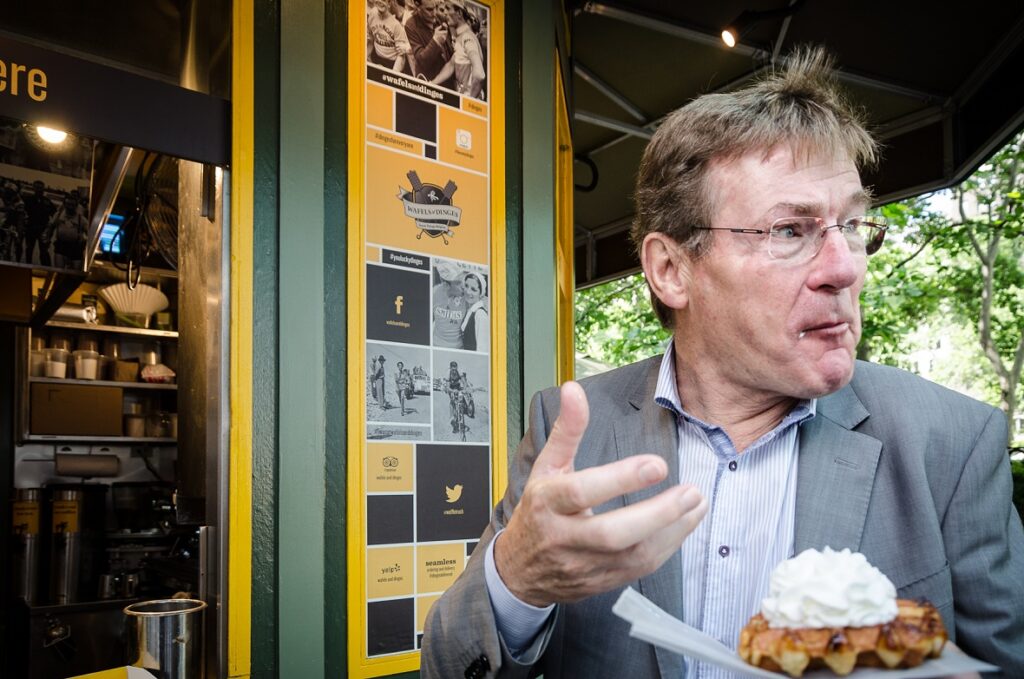
Trying out waffles in New York
“But the last five years were rather successful in terms of achievements,” he says brightly, referring to his most influential MEP title as a “great honour”. Conferred by communications agency BCW, its annual EU Influence Index ranks the ability to influence legislation and shape the policy agenda.
Biggest achievement
Tall and slim, indeed dapper in matching blue slacks and sweater when we meet, cycling-enthusiast Van Overtveldt looks younger than his age. He’s on his bike every weekend, either alone or with a couple of friends.
He proudly points to a photo on his office wall which shows him on his racing bike, riding hard in the Pyrenees mountains. He needs high energy levels to sustain his prodigious work ethic – he is often at his desk since 7.30am.
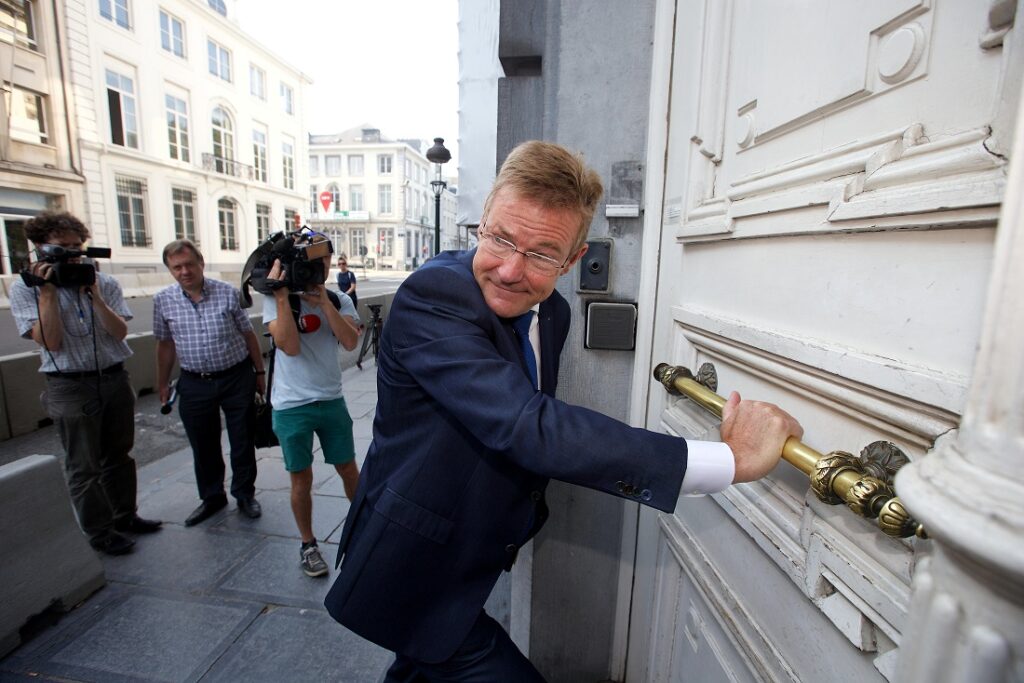
Entering the Prime Minister's office on Rue de la Loi
Asked what he sees as his biggest achievement during the present term, Van Overtveldt replies that it is the skillset he brought from Belgian politics. “You always have to be on the lookout for compromise and where the common ground between sometimes quite extreme visions is. As chairman of the Budget Committee, I could bring that skill. Bridge builder, compromise seeker, that's basically my main contribution.”
Disappointments
What about the other side of the coin, the low points of the past term? Van Overtveldt says his biggest disappointment is the Green Deal, the huge environmental programme aimed at cutting Europe’s carbon footprint. “From the beginning, I warned that, although in principle the objectives were fine and defendable, there was a neglect of the medium term.”
Van Overtveldt lays much of the blame for this at the door of former European Commission Vice-President Frans Timmermans, who quit to run as leader of the GroenLinks-Labour Party (PvdA) alliance in the Dutch national election last November.
“When he talked about what he wanted to do about the reductions in CO2 emissions and greening of the economy, Timmermans always gave the impression that we could go from the situation of today in which fossil fuels are absurdly dominant to a situation where they would almost disappear – in one big step. Which I found absolute nonsense. I’m sure that in 20 years, we will still be using fossil fuels, albeit a lot less than we do today. To think that we could go to just relying on sustainable energy like sun and wind, I could not understand that serious people would argue that. They were throwing nuclear energy out of the window as well.
“Luckily, the mindset is changing, also here in the Parliament. So the big disappointment I had two or three years ago is changing into some satisfaction of having maybe contributed a little to the change in attitude and policy action,” says Van Overtveldt.
EU spending
The EU has a massive budget – nearly €190 billion in commitments for 2024 alone. Is Europe spending taxpayers’ money on the right priorities?
“The budget should be more closely scrutinised and certainly could be subject to two important improvements. Two-thirds, roughly, is currently spent on cohesion policy and agricultural policy, the policies of the past. I do not mean that agricultural support is not necessary. My point is that the policy should be thoroughly revised and we should develop new ways of aiding farmers in the very essential role that they play. Not only in our food supply but also in the way in which they take care of our nature and ecological environment.”
He is less forgiving about the EU’s cohesion policy, which funds regional development to even out economic imbalances between and within countries.
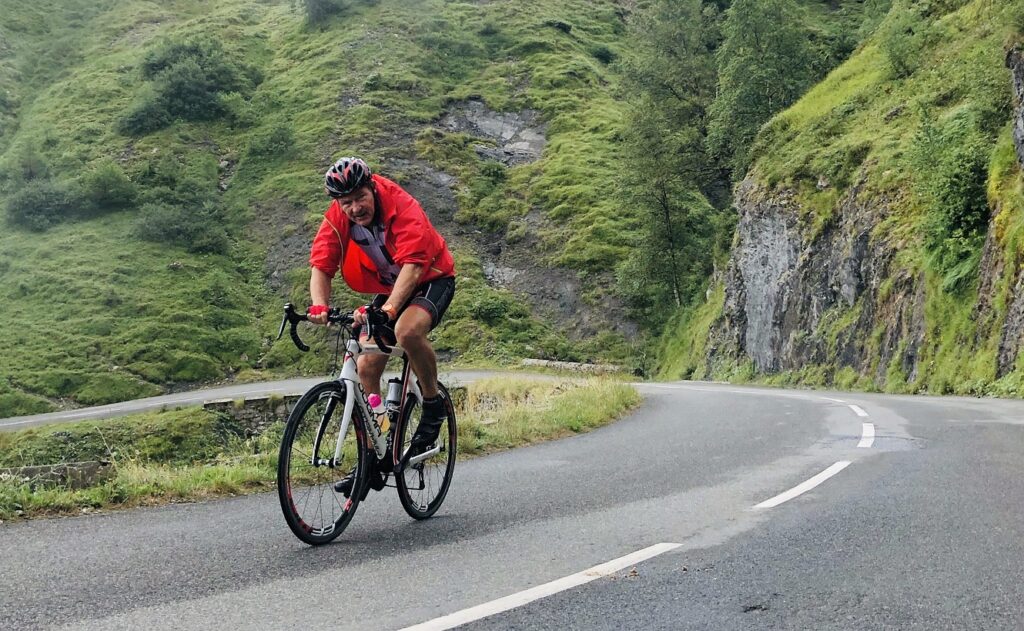
On his bike
“The national ‘envelopes’, in which cohesion policy is packaged, are very detrimental. Every country says ‘No, no, you cannot touch this," he says, noting that cohesion policy overlaps with the Recovery and Resiliency Facility (RFF), a €723 billion package of loans and grants launched by EU in the wake of the Covid pandemic. "My emphasis from the beginning has been on redirecting spending towards the future. If we could liberate €15 billion from cohesion and the same from agricultural policy, redirecting it towards research and development, Europe’s competitiveness vis-a-vis the US and China would look substantially different.”
Van Overtveldt is a bigger fan of the EU’s Horizon programme, which has a budget of €95.5 billion to support research and innovation. “It has clearly proven its added value,” he says – apparently willing to overlook that this also overlaps somewhat with the RFF behemoth.
Ukraine
Our conversation turns to the conflicts in Ukraine and the Middle East. Asked if he supports the EU spending more to support Volodymyr Zelensky and his country’s fight against Russia, it’s a “yes”, albeit with reservations.
“Ukraine is still, to a regrettable extent, a corrupt country, but if we don't help it, we should no longer be allowed to call ourselves democracies and defenders of democracy. We need to stop Mr Putin. If that costs €50 billion, I'm okay with that. If that costs €100 billion tomorrow, I'm okay with that, too. But we should improve our control of the money. We're working on that. We need to make sure that it’s all spent in the best way to achieve a situation where the independence of Ukraine remains intact. And where we can say to Mr Putin, nice try, but we stand firm. If you're serious about defending democracy, we cannot drop Ukraine. That's absolutely out of the question for me.”
However, Van Overtveldt is not in favour of Ukraine becoming a member of the EU anytime soon. “We have to open the discussions,” he says. “But if we allow Ukraine in tomorrow, or even in two years, that would be really impossible to manage. Given our budgetary and financial context in the European Union, with Ukraine being such an important producer the agricultural policy would explode. So that would certainly not be feasible.”
Gaza ceasefire
Van Overtveldt also has reservations about the situation in the Middle East. He has previously called for tighter controls on the European funds the Palestinians – and still has concerns about whether EU money should end up compensating the families of ‘martyrs’. “We should scrutinise this much better,” he says.
He is uneasy about calls for a ceasefire in Gaza. “There was a ‘manifestation’ here in Brussels the other day, calling for a ceasefire, for more dignity for the Palestinians, calling for a lot of things. But I heard nobody talk about the atrocities committed by Hamas. And that view is becoming more and more mainstream in Western media. They forget what ignited this very horrible situation for ordinary Palestinians. Calling just for a ceasefire is to a certain degree saying to Hamas, well, you can try it again tomorrow.”
Future priorities
Assuming he is re-elected, Van Overtveldt says that one of his main future priorities is achieving a “more unified and connected energy grid in Europe”. If that sounds a bit technical, he explains it might have made the Kremlin think twice about their ‘special military operation’ in Ukraine.
“We have LNG [liquefied natural gas] terminals in Spain and Italy, where we could immediately accept more tankers, but we couldn't get the gas to Germany. If we’d had that, we would have cut off Mr Putin's war machine a lot earlier and we wouldn’t have had an energy price war, which led to a full price war. We're working on it now with the RFF investments, but it came a little late.”
As well as electing 22 members of the European Parliament, Belgians will also vote for federal and regional representatives on June 9. Anyone aged 16 or over can cast their vote while it is compulsory for citizens aged 18 or over.
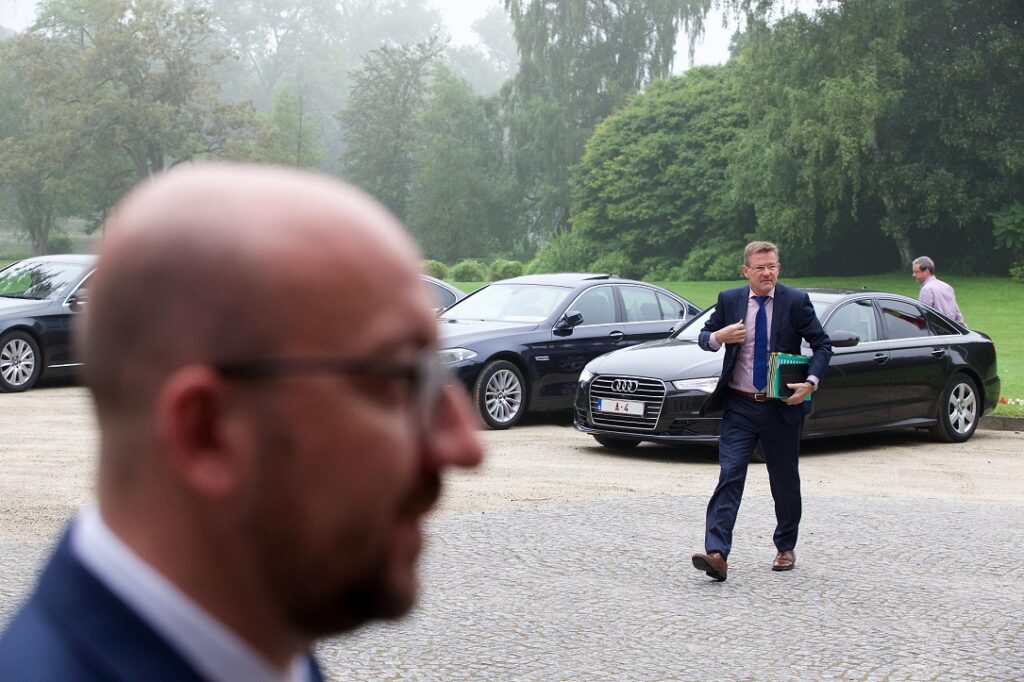
With then Prime Minister Charles Michel
Polls show that the far-right Vlaams Belang, which wants Flanders to be an independent state, has held a consistent lead in its predicted vote share with N-VA in second place, ahead of PVDA (Partij van de Arbeid) and the Parti Socialiste. Some fear that Belgium could witness a right-wing surge similar to the Netherlands last November, where the Freedom Party (Partij voor de Vrijheid or PVV) led by Geert Wilders finished first. Some N-VA members, including MP Sarah Smeyers, have suggested it would be a “historical mistake” if the party does not cooperate with Vlaams Belang.
Van Overtveldt takes a different view. “The issues that apparently drive more and more voters to the extreme right are decided at the federal level. Migration, the transfers between Flanders and the Walloon area, and labour market policies. Are other parties prepared to join a government with Vlaams Belang? The answer is no. So the whole thing is a non-issue.”
Challenged on whether the N-VA’s programme is not a world away from that of Vlaams Belang, Van Overtveldt demurs. “There is a big difference,” he says. “In its economic policies, Vlaams Belang is really on the left. If you add up all their promises, you end up with billions and billions a year more than now. The N-VA is a much more conservative, market-oriented party that thinks carefully about incentives to work, invest and save. If you implemented Vlaams Belang’s policies, our country’s deficit would explode to levels not seen in peacetime.”
He acknowledges that it is much easier to get the Belgian public interested in national rather than EU issues. “It is particularly difficult for me because I’m focused on legislative work in the European Parliament. I’ve not had an easy time explaining to audiences in Belgium what I do because the material I work on is quite specialised and a little bit highbrow. Nor am I interested in the shouting and screaming side of politics where a lot of things said on a Monday afternoon are forgotten by Tuesday morning.”
Biden v Trump
Van Overtveldt stresses that, while the elections in Europe matter, November’s presidential election in the US is “much more important in terms of what will happen worldwide and hence also in Europe”.
At the time of writing, it looks like it will be a re-match between Joe Biden and Donald Trump. Who would Van Overtveldt cast his vote for?
“Unequivocally, I would go for Joe Biden. Mr Trump is an irresponsible man. I detest his manners, the way he insults people and makes them look ridiculous, although they are often not, his unpredictability, his vicious anti-NATO views, and his pro-Putin attitude. I’m quite a hardliner with respect to China, but I don't trust him with this immensely important relationship because he might do crazy things. Mr Biden has done a quite decent job over the past four years. His support for Ukraine, despite the overall attitude in the United States, has been commendable. I also think the way in which the US has managed the Gaza conflict, given the very thorny issues involved, is also quite commendable.”
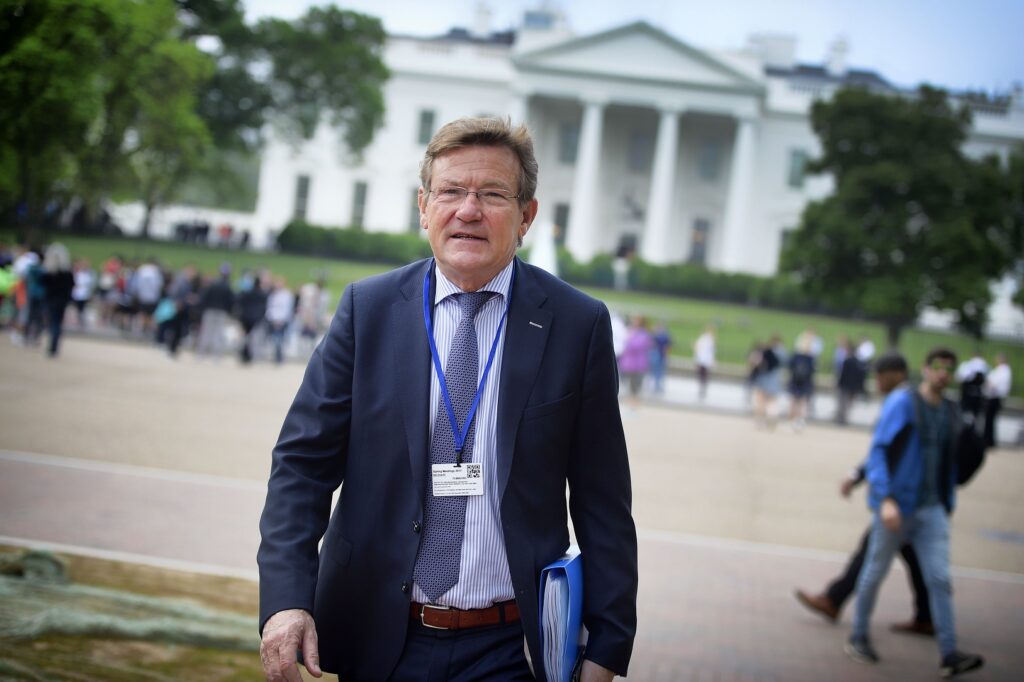
At the White House in 2017
There’s just time for a few quick-fire questions. Alexander De Croo has called for the EU to have more of its ‘own’ money, so-called own resources such as customs duties and other taxes, flowing directly into its coffers. Does Van Overtveldt agree?
He looks exasperated. “We should first look very carefully at current expenditures. I'm certain if we do that in a determined way we could find €20 billion a year. To those who say that to have a more unified Europe we need European taxes, I say stop the bullshit. You may end up with a more divisive EU because countries will argue about who pays what. What the fuck is wrong with the GNI (gross national income) system where every country pays according to its possibilities? it's as simple and as transparent as can be if you need more money. So, no, Mr De Croo is wrong.”
Should the N-VA leave the European Conservatives and Reformists (ECR) group, which includes the likes of Poland’s Law and Justice Party, the Brothers of Italy, Finns Party and Spain’s Vox – all tainted by far-right associations?
“When we joined in 2014, the overriding argument was the presence of the British Tories. The Tories are gone and although some developments within ECR are a little bit uncomfortable, we still feel quite comfortable overall, not least because ECR gives you the most liberty in terms of your voting behaviour.”
Hemingway moment
And, finally, inevitably, his view on Flemish independence. “I think we need a confederation. We start from the view that we should do everything at a regional level, except where there is a clear intellectual argument for dealing with issues at the overall level. Defence and foreign affairs being the two most obvious areas of this added value. Flanders and Wallonia have become so different that it will make life a lot easier if we go into the confederal ‘esprit’ instead of the botched-up federal situation we have now.”
Will he see Flemish independence in his lifetime?
“At one point we will have to get there. When it will happen is difficult to say. I always talk about the ‘Hemingway moment’. In The Sun Also Rises – a wonderful book – one of the characters has gone bankrupt. Another asks how it happened. The bankrupt guy says, ‘Well very slowly and then all of a sudden’. A lot of things happen very slowly – and then all of a sudden.
“I think something similar will happen with Belgium’s status. We've been talking about independence for a long time. A lot of people say it will never happen, but one day it will happen and that day may be far away – but it could be just around the corner, depending on circumstances. It could be election results or the appearance of decisive political figures. You will then have the Hemingway moment.”

